2014 年北京科技大学单独考试英语考研真题
北 京 科 技 大 学
2014 年硕士学位研究生入学考试试题
==============================================================================
试题编号: 240
试题名称:
单独考试英语
适用专业:
单独考试各专业
说明: 所有答案必须写在答题纸上,做在试题或草稿纸上无效。
==============================================================================
(20 minutes, 10 points, 0.5 point each)
Part I: Vocabulary
Section A
Directions: Thereare10incompletesentencesinthispart.Foreachsentencethere
are four choices marked A., B., C. and D. Choose the ONE that best completes the
sentence and mark your answer on the ANSWER SHEET.
1. If you
you want.
your demand, then maybe you will have more chance of getting what
A. lessen
B. moderate
C. dismiss
D. overcome
2. The professor's argument was
with his conclusion.
reasonable, but the audience did not agree
A. suspiciously
B. seemingly
C. critically
D.
theoretically
3. I suppose I'll have to look for a job;
wife or starve.
I'll either have to find a rich
A.otherwise
B. that's why
C. else
4. Many photographers prefer to take pictures
of the special effects of the setting sun.
D. on the other hand
when they can take advantage
A.at twilight
B. at noon
C. in the morning
D. in the fall
5. The finance question must be answered with
investors' fears of fraud.
in order to relieve the
A.accuracy
B. exactness
C. precision
D. correction
6. The survival
hunted for their skins.
of some wild animals is not very high as they are ruthlessly
A.ratio
B. proportion
C. rate
D. scale
7. So far as he could,John had always tried to
the example he saw in Lincoln.
A.live up to
B. set forth
C. call for
D. cut out
8. The students gradually
a knowledge of the subject.
A.acquired
B. attained
C. achieved
D. obtained
9. He didn't openly attack the plan, but his opposition was
to say anything in support of it.
in his failure
A. explicit
B. implicit
C. decisive
D. obvious
10. The newly-built bridge that
the river is convenient to the people living
�
in this area.
A.traverses
B. spans
C. protects
D. overlooks
Section B
Directions: In this section, there are ten sentences with one word or phrase
underlinedeach.ChooseoneofthefourchoicesmarkedA,B,CandDthatbestkeeps
the meaning of the sentence if it is substituted for the underlined word.
11. She didn't openly attack the plan,but her opposition was implicit in her failure
to say anything in support of it.
A.explicit
B. obvious
C. decisive
D. underlying
12. When he was very young,he was afflicted with paralysis.
A.troubled
B. bothered
C. influenced
D. stricken
13. She was still writing away furiously when the bell went.
A.continually
B. hard
C. easily
D. continuously
A. indifferent
B. indivisible
14. A good dictionary is indispensable for learning English.
C. essential
D. elective
15. The severe earthquake damaged buildings as well as public or personal property
in them.
A.materials
B. substances
C. possessions
D. qualities
16. At first I wasn't able to identify my brother in the crowd as he had changed
so much since his departure.
A.make up
B. make out
C. make for
D. make in
17. Some people persist in the practice of some very old customs or traditions just
because they enjoy doing so.
A.endure
B. support
C. stick to
D. continue in
18. The teacher told stories about Washington and Lincoln in respect to the
importance of being honest.
A.in connection with
C.along with
B. in case of
D. together with
19. Being infamous for his dishonesty in business matters,the man had few friends.
A.fresh
B. immediate
C. notorious
D. famous
20. He was very careful in whatever he did lest something unfavourable might be
written into his record.
A.if only
otherwise
B. for fear that
C. unless
D.
Cloze Test (20 minutes, 10 points, 1 point each)
Part II
Directions: For each blank in the following passage, choose the best answer from
thechoicesgivenbelow.MarkyouranswerontheAnswerSheetbydrawingwithapencil
a short bar across the corresponding letter in the brackets.
It is difficult to imagine what life would be like without memory. The meanings
of thousands of everyday perceptions, the bases __21__ the decisions we make, and
the roots of our habits and skills are to be __22__ in our past experience, which
�
are brought into the present __23__ memory.
Memory can be defined as the capacity to keep __24__ available for later use.
It includes not only "remembering" things like arithmetic or historical facts, but
also any change in the way an animal typically behaves. Memory is __25__ when a rat
gives up eating grain because he has sniffed something suspicious in the grain pile.
Memory is also involved when a six-year-ole child learns to swing a baseball bat.
Memory __26__ not only in humans and animals but also in some physical objects
and machines. Computers, for example, contain devices for storing data for later
use. It is interesting to compare the memory-storage capacity of a computer __27__
that of a human being. The instant-access memory of a large computer may hold up
to 100 000 "words"--ready for __28__ use. An average American teenager probably
recognizes the meanings of about 100 000 words of English. However, this is but a
fraction of the total __29__ of information which the teenager has stored. Consider,
for example, the number of facts and places that the teenager can recognize on sight.
The use of words is the basis of the advanced problem-solving intelligence of human
beings. A large part of a person's memory is in terms of words and __30__ of words.
D. on
D. in
D. stored
B. to
B. found
C. affects
C. against
C. observations D. information
C. involved
D. included
C. for
C. sought
C. with
B. from
B. bases
B. taken
B. appears
B. with
B. instructive
21. A. of
22. A. keep
23. A. by
24. A. experiences
25. A. called
26. A. exists
27. A. to
28. A. progressive
29. A. deal
30. A. combinations B. connections
Part III Reading Comprehension (60 minutes, 40 points)
Section A (30 points, 1.5 points each)
Directions: Inthisparttherearefourpassagesfollowedbyquestionsorunfinished
statements,eachwithfoursuggestedanswers.Choosetheoneyouthinkisthebest
answer and mark your choice on the Answer Sheet.
Passage One
Questions 31-35 are based on the following passage:
C. co-ordinations
D. collections
B. number
C. mount
C. instant
D. protective
D. seems
D. for
D. amount
All along the chain of biological evolution, the extinction of species appears
to have been a stage in the process of adapting genetic lineages to changing
environmental conditions. Although some catastrophic extinction occurred naturally,
producing total loss of a genetic line, such catastrophes were comparatively rare.
In modern times, however, human activities have altered the fundamental nature of
this process, resulting in nearly total genetic losses.
It is not difficult to gain general agreement that man-induced increases in the
endangerment and extinction of wildlife-whether due to habitat alteration or loss,
pollution, insufficiently regulated hunting, or other factors -are undesirable. It
is, however, more difficult to obtain consensus when consideration is given to the
�
economic costs of correcting such trends, including natural habitat preservation,
regulation of pesticides and other toxic substances, and wildlife and park
management. Endangered species often are, in effect, competitors with humans for
habitat and other resources which also provide other kinds of human uses and needs.
Measures needed to protect endangered species vary considerably in difficulty
and cost. Of the approximately 400 invertebrate species which at present appear to
be threatened, for example, about one-third could probably be restored by such
inexpensive means as modifying the boundaries of designated natural areas, acquiring
and protecting caves and other small areas which contain the particular species,
and additional management of parks and refuges.
Another one-third of the endangered lower animal species are threatened
principally by water pollution and could be protected by improved control,
particularly of five southern rivers.
The remaining one-third of the 400 endangered shellfish species would be
considerably more difficult to protect. These are threatened by complex factors,
such as overcorrecting, channelization, highway and housing development, dams,
introduced species such as the Asian snail, dredging, quarry washing, poor erosion
control, and lowering of water tables.
The identification of threatened species and other significant wildlife trends
must precede any corrective measures, and our knowledge base for making such
identification is deficient in many respects. Our present lists of threatened
species and subspecies are known to be incomplete, except in those geographical areas
which contain habitats of species that have important commercial or sports harvest
value.
31. The passage is primarily concerned with discussing ________.
A. the catastrophes in history which caused the extinction of total species
B. the ways to protect endangered species
C. the characteristics of threatened species
D. the significance of protecting threatened species
32. What's the author's attitude toward the view that it is catastrophes that result
in the total genetic losses?
A. Positive.
B. Negative.
C. Neutral.
D.
Enthusiastic.
33. With which if the following statements would the author most likely agree?
A. People haven't realized the impact of human activities on the extinction of
wildlife.
B. It is difficult for people to agree to protect endangered species at
considerable economic cost.
C. Endangered species can provide human beings with a variety of useful resources.
D. Similar measures can be taken to protect various endangered species.
34. The author mentions all of the following as threats to shellfish species except
________.
A. highway and housing development
�
B. poor erosion control
C. overpopulation of shellfish
D. lowering of water tables
35. Given the information in the passage, which of the following is not true of
wildlife protection?
A. The identification of threatened species should come before correction.
B. We have gained sufficient knowledge for making identification of endangered
species.
C. Our present lists of threatened species are incomplete.
D. Some geographical areas contain habitats of species that have important
commercial value.
Passage Two
Questions 36-40 are based on the following passage:
Researchers have learned to mix optimism with caution, and some of their results
are demonstrating definite promise.
When Matthew During and Michael Kaplitt first went hunting for capital to
commercialize their research in gene therapy, their timing couldn't have been worse.
It was the fall of 1999, just after teenager Jesse Gelsinger died in a clinical trial
of gene therapy - the use of genes to deliver medicines to diseased cells. Together,
During and Kaplitt were able to scrape up an initial $2.5 million. "Maybe we were
arrogant to think we could start something at that time," Kaplitt concedes. Today,
the two physician founders of Neurologix, in Fort Lee, N.J., are feeling much more
upbeat. They're searching for $10 million to fund a pivotal trial in Parkinson's
disease, and they expect to find it.
Others are also prospecting in the once-neglected field of gene therapy. On Nov.
7, Colgate-Palmolive invested $20 million in Austin-based Introgen Therapeutics,
which is pursuing novel remedies for oral cancer.
And the Michael J. Fox Foundation is about to award its first-ever grant for
gene therapy research. The $750,000 will go to San Diego-based Ceregene, which, like
Neurologix, is zeroing in on a treatment for Parkinson's, the disease that afflicts
actor Fox. Ceregene also raised $32 million in venture capital last year.
Recent success stories in clinics and labs add to the sense that gene therapy
is moving back into the mainstream. China has been quietly approving such treatments.
And on Nov. 22, Genzyme (GENZ), in Cambridge, Mass., announced it will spend $3.2
million to acquire a manufacturing facility that will make several gene therapy
treatments, including one aimed at a common condition among the elderly called
peripheral arterial disease.
"We've been in gene therapy a long time, and we've seen the ups and downs," says
Richard Gregory, Genzyme's senior vice-president of research. "But we're
optimistic."
36. What were things like when Matthew During and Michael first raise money for their
study of gene therapy?
A. They were very lucky.
B. They were very confident.
�
C. A teenager died in a lab experiment of gene therapy.
D. People's confidence in gene therapy was unreasonably high.
37. The word "upbeat" in paragraph 2 is closest in meaning to __________.
A. proud
B. optimistic
C. anxious
D. serious
38. All the following diseases are mentioned in the passage except __________.
A. Down's syndrome
B. Parkinson's disease
C. oral cancer
D. peripheral arterial disease
39. What do we know about the research of gene therapy?
A. In the 20th century, gene therapy was suspected and neglected.
B. Gene therapy becomes the prevailing method of treating patients now.
C. San Diego-based Ceregene has achieved nothing in gene therapy research so far.
D. The successes of gene therapy in clinics and labs restore people's confidence
in gene therapy.
40. What is the author's attitude towards gene therapy?
A. optimistic
B. pessimistic
C. indifferent
D. neutral
Passage Three
Questions 41-45 are based on the following passage:
We are all interested in equality, but while some people try to protect the school
and examination system in the name of equality, others, still in the name of equality,
want only to destroy it.
Any society which is interested in equality of opportunity and standards of
achievement must regularly test its pupils. The standards may be changed--no
examination is perfect--but to have no external tests or examinations would mean
the end of equality and of standards. There are groups of people who oppose this
view and who do not believe either in external examinations or in any controls in
schools or on teachers. This would mean that everything would depend on luck since
every pupil would depend on the efficiency, the ideals and the purpose of each
teacher.
Without external examinations, employers will look for employees from the highly
respected schools and from families known to them--a form of favoritism will replace
equality. At the moment, the bright child from an ill-respected school can show
certificates to prove he or she is suitable for a job, while the lack of certificate
indicates the unsuitability of a dull child attending a well-respected school. This
defense of excellence and opportunity would disappear if external examinations were
taken away, and the bright child from a poor family would be a prisoner of his or
her school's reputation, unable to compete for employment with the child from the
favored school.
The opponents of the examination system suggest that examinations are an evil
force because they show differences between pupils. According to these people, there
�
must be no special, different, academic class. They have even suggested that there
should be no form of difference in sport or any other area:
all jobs or posts should
be filled by unsystematic selection. The selection would be made by people who
themselves are presumably selected by some computer.
These people are not just against school organization, but are at war with the
whole idea of modern competitive society and they are using children in schools for
their destructive purposes. There is no reason why we should allow such people to
determine the way our schools are organized when it is to the obvious disadvantage
of the pupils, of the schools and of our society as a whole.
41. What is the opinion of the writer?
A. We cannot have standards because examinations are not perfect.
B. Without examinations there would be no standards.
C. Standards must keep changing in order to achieve equality.
D. Changing the standards could mean the end of equality.
42. What is the situation at the moment?
A. A school's reputation is not very important, as long as a certificate.
B. A bright child doesn't need certificates to get a job.
C. Children attending well-respected schools do not get certificates.
D. Many children who are suitable for a job have no proof of their suitability.
43. According to the writer, what would happen if external examinations were taken
away?
A. Children from poor families would not be able to change school.
B. There would be no more opportunities and no more excellence.
C. Schools for bright children would lose their reputation.
D. Going to a favored school would be the only way to get a good job.
44. According to the writer, the opponents of the examination system say that
________.
A. computers should be selected to take over many jobs
B. particular people should not be chosen for particular jobs
C. examinations are only bad when they show differences between people
D. schools specializing in academic subjects should be done away with
45. In what way do the opponents of the examination system want to influence schools?
A. They want children to compete more in school.
B. They want to reorganize schools.
C. They want schools to be more modern.
D. They want to destroy schools.
Passage Four
Questions 46-50 are based on the following passage:
The exclusive emphasis on economics is yielding to an appreciation of politics.
After all, before free market can thrive you need political stability. Technology
is still seen as a powerful tool, but one that can have harmful as well as beneficial
consequences (as Osama bin Laden has brutally shown). Most important, the global
trading system is becoming more democratic, with countries like India, China and
Brazil demanding a voice in the shape of trade negotiations. This too could be for
�
the best. If a few concessions and delays mean that the free-trade system will have
greater legitimacy in the developing world, it is a price well worth paying.
Even September 11 could be even more beneficial. In the past four months the
world has seen what American political leadership and power can do when it is
ambitious, energetic and internationally minded. It is time for American economic
leadership to be similarly active and visionary. Treasury Secretary Paul O'Neill's
speech at the forum was an interesting beginning. O'Neill talked about changing the
loans-and-grants system to developing countries to help them help themselves. He
talked about insisting on internal legal and political reforms. He pointed out that
foreign aid rarely works. His critiques of the current system was sharp, but anyone
can criticize. The point is to fix things. He should take this opportunity to present
a series of broad American initiatives that would broaden and deepen globalization.
Washington should lead the developed world by responding to the legitimate
demands of the developing world on trade-that means agriculture and anti-dumping.
Hormats argues for a reform of the major international economic groups and
institutions. A new system of effective foreign aid could have massive economic and
political benefits for the whole world.
In the wake of World War II, the Truman administration set up the global economic
institutions that have secured and steered the world economy ever since. Throughout
the cold war, America pushed for free trade as part of an overall strategy to combat
communism and shore up the free world. Making globalization work better and for more
people is not simply smart economics. It is a vital part of a new national-security
strategy for America.
46. Which of the following is more emphasized now after September 11?
A. Domestic economy.
B. Politics.
C. National Security.
D. Global unity in fighting terrorism.
47. What does Hormats argue for?
A. The developing countries have to help themselves.
B. A new system of effective foreign aids will work well.
C. The USA pushed and will push free trade world widely to combat communism.
D. The foreign aids rarely work.
48. What makes the author's opinion different from O'Neill's?
A. The author thought that O'Neill's talk was not to the point.
B. The author didn't like the talker personally.
C. O'Neill should have presented what to do to improve the economic globalization.
D. The author thought what O'Neill said was precise, but not workable.
49. What does the author intend to say through the last paragraph?
A. The Americans should follow Truman's global economic policy.
B. The author suggests that the USA should have done more.
C. The USA should pursue to combat the communism in economic competition.
D. The Americans may live in luxurious and quiet surroundings under the conditions
of the globalization.
�
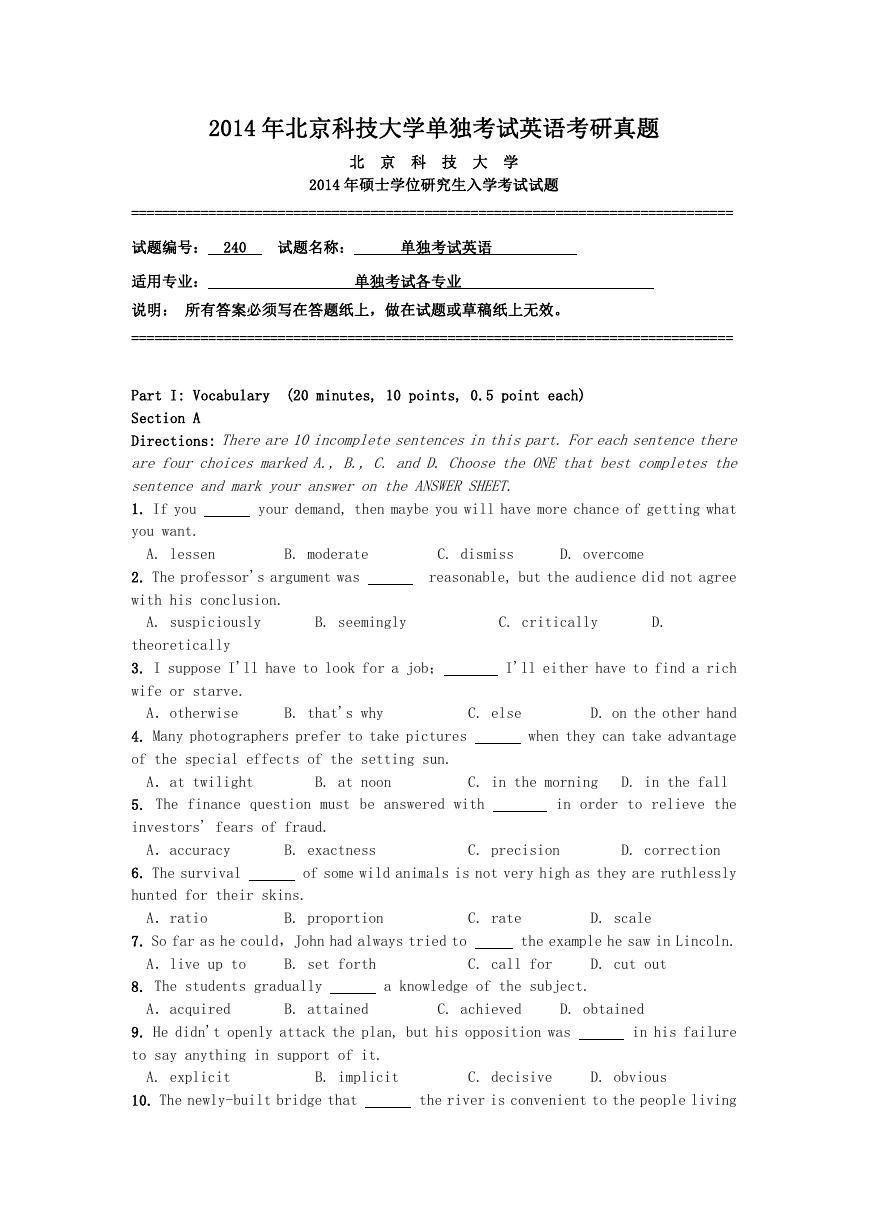
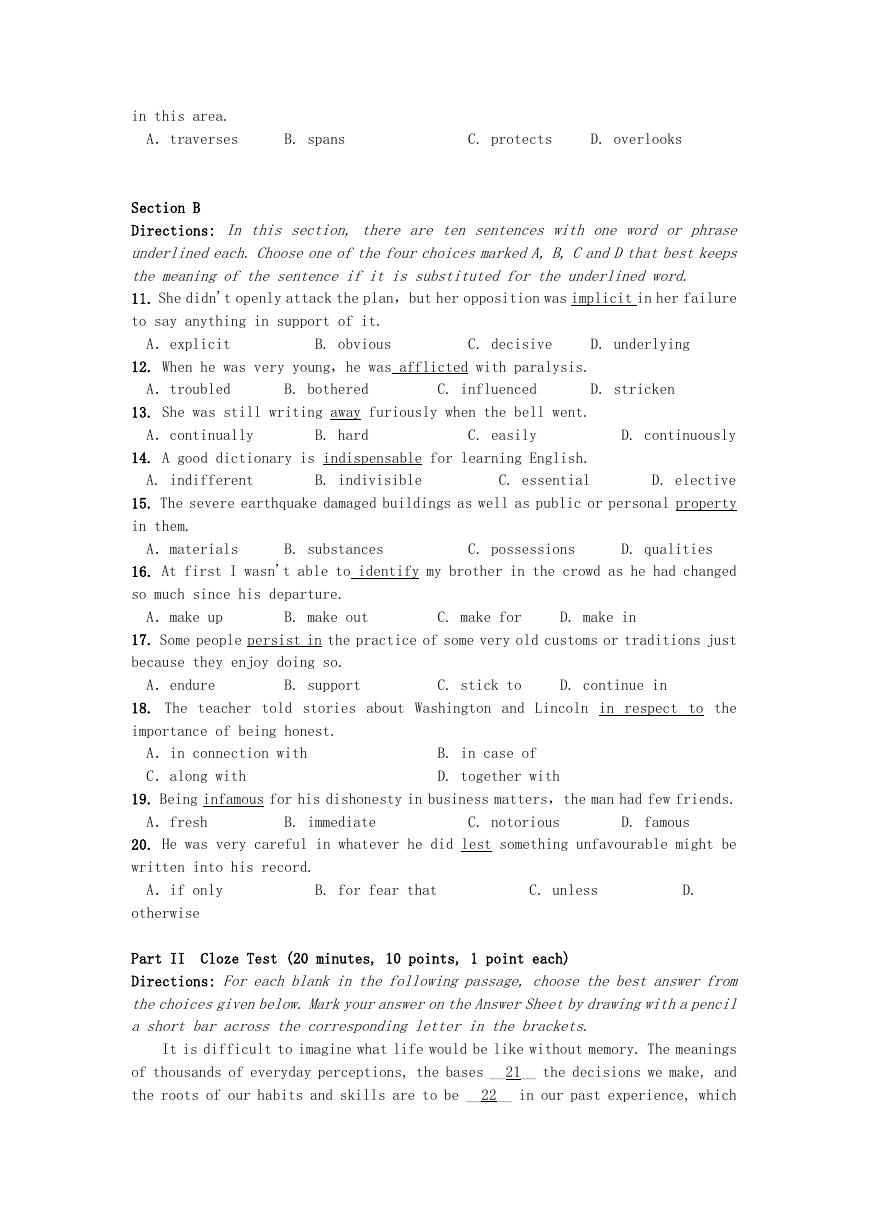
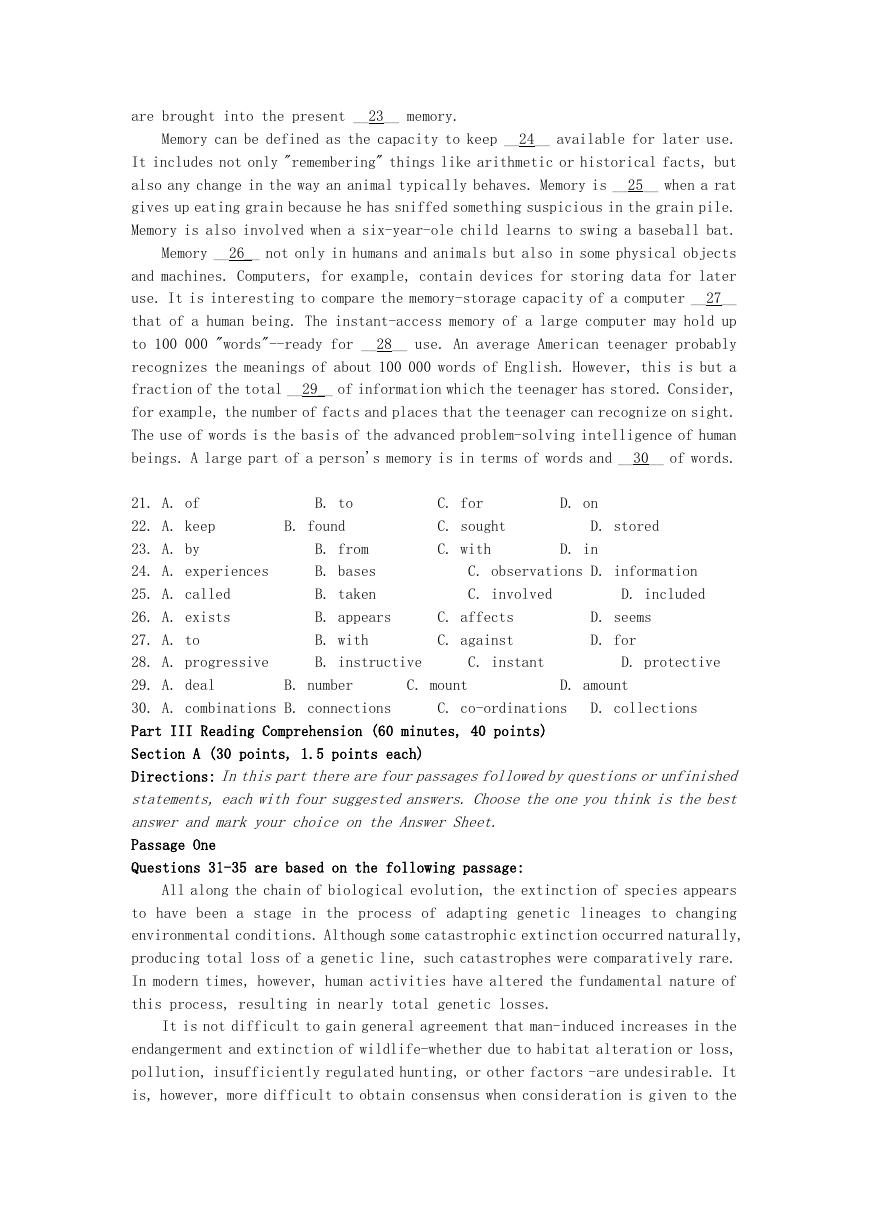
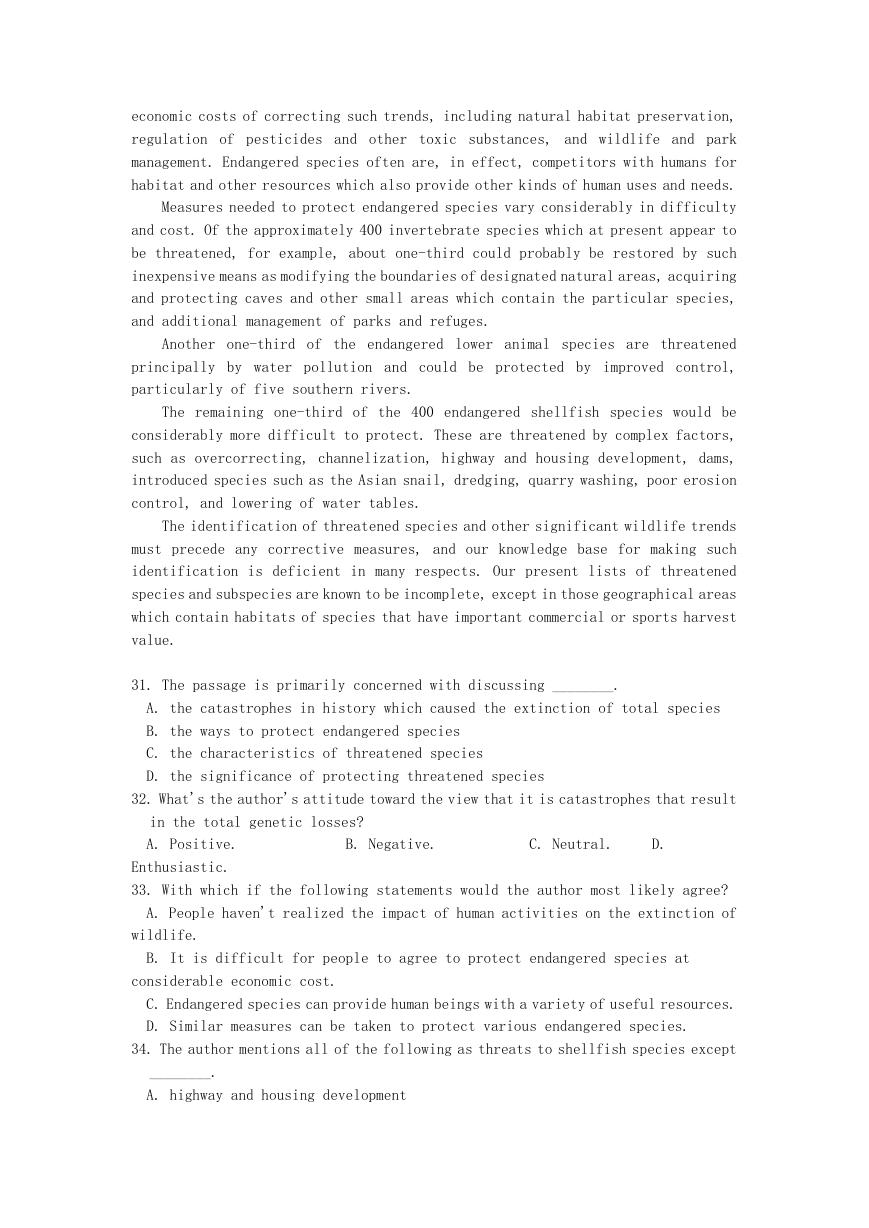
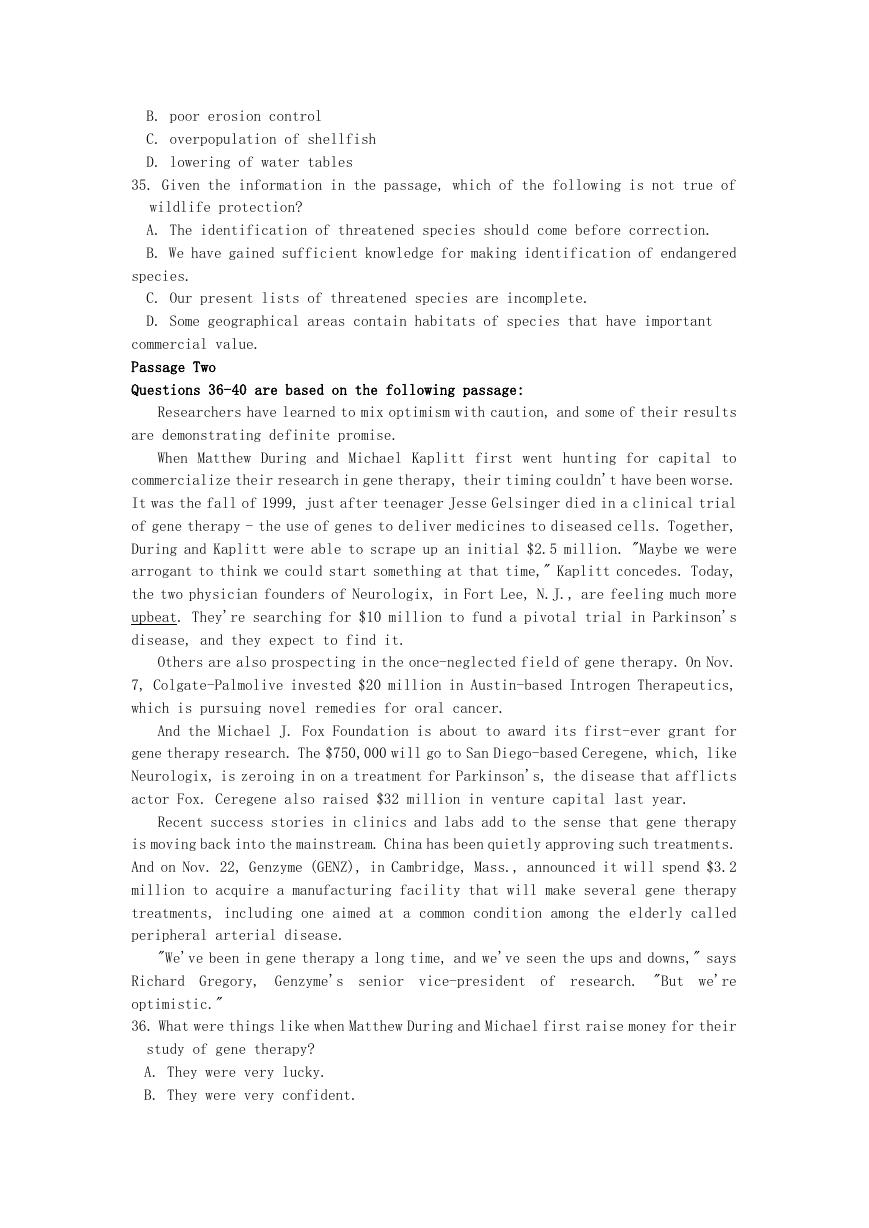
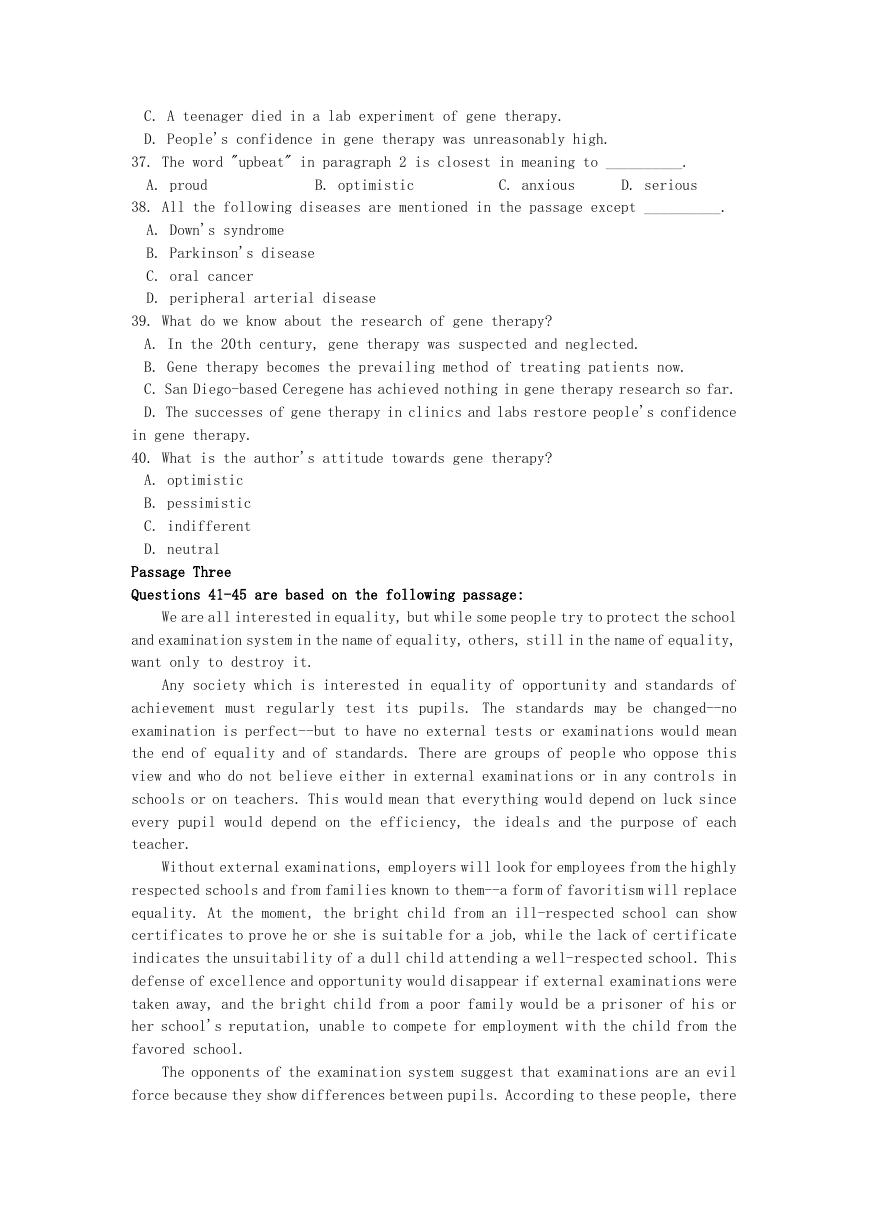
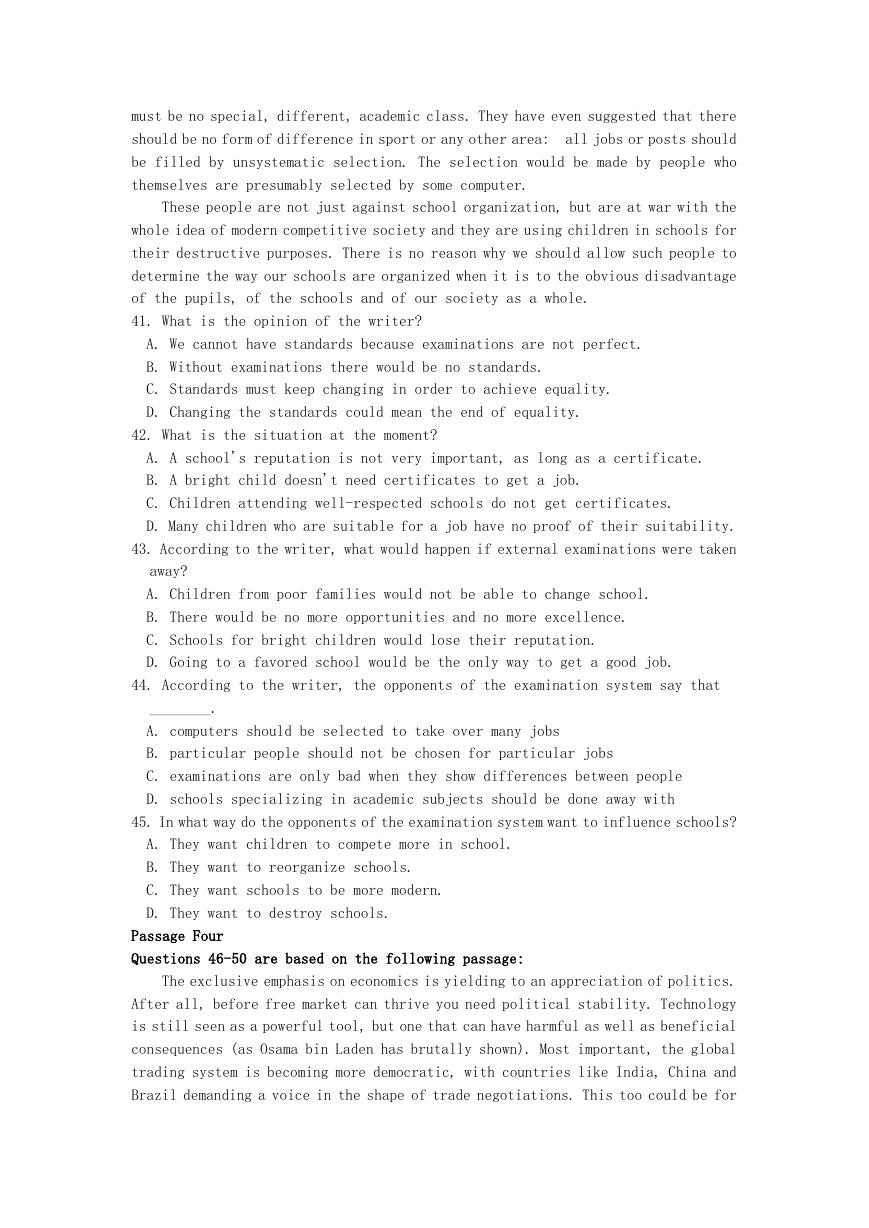
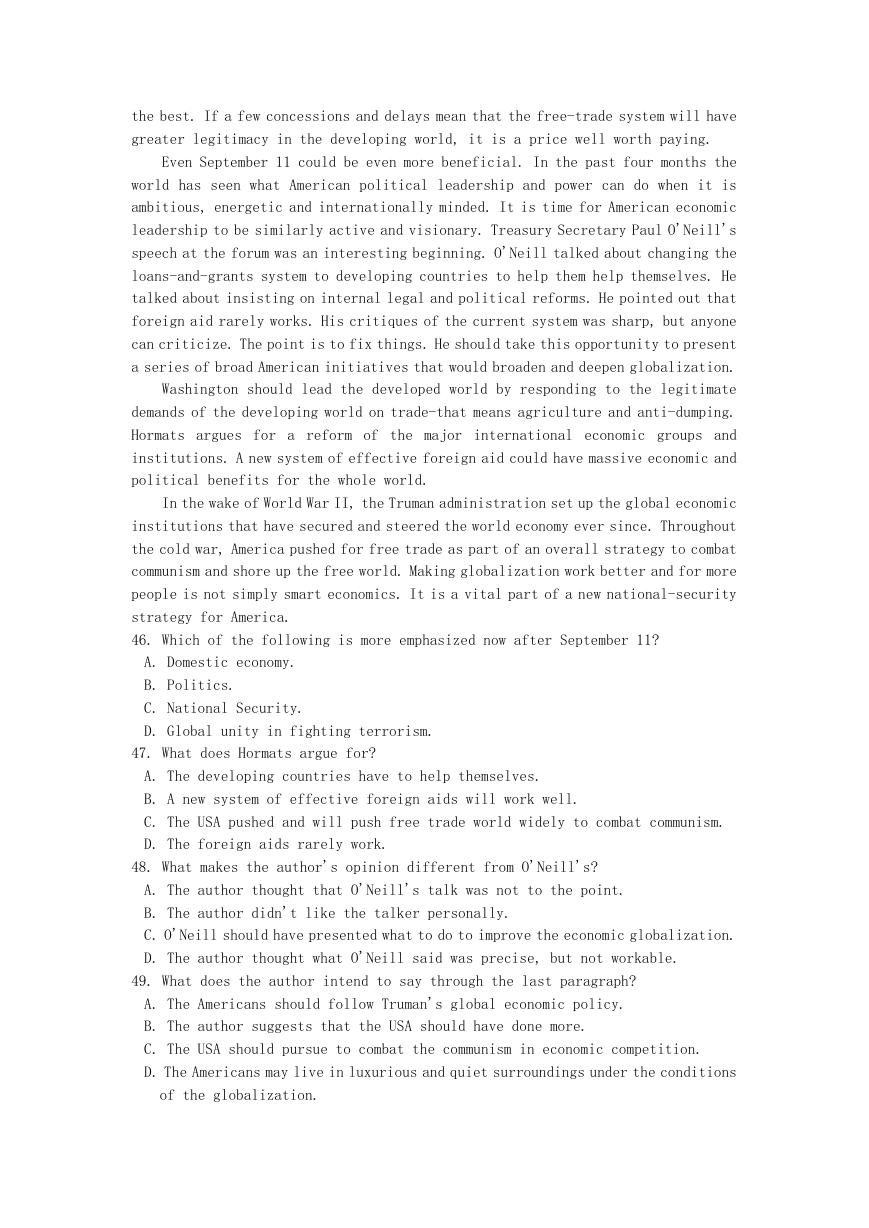








 2023年江西萍乡中考道德与法治真题及答案.doc
2023年江西萍乡中考道德与法治真题及答案.doc 2012年重庆南川中考生物真题及答案.doc
2012年重庆南川中考生物真题及答案.doc 2013年江西师范大学地理学综合及文艺理论基础考研真题.doc
2013年江西师范大学地理学综合及文艺理论基础考研真题.doc 2020年四川甘孜小升初语文真题及答案I卷.doc
2020年四川甘孜小升初语文真题及答案I卷.doc 2020年注册岩土工程师专业基础考试真题及答案.doc
2020年注册岩土工程师专业基础考试真题及答案.doc 2023-2024学年福建省厦门市九年级上学期数学月考试题及答案.doc
2023-2024学年福建省厦门市九年级上学期数学月考试题及答案.doc 2021-2022学年辽宁省沈阳市大东区九年级上学期语文期末试题及答案.doc
2021-2022学年辽宁省沈阳市大东区九年级上学期语文期末试题及答案.doc 2022-2023学年北京东城区初三第一学期物理期末试卷及答案.doc
2022-2023学年北京东城区初三第一学期物理期末试卷及答案.doc 2018上半年江西教师资格初中地理学科知识与教学能力真题及答案.doc
2018上半年江西教师资格初中地理学科知识与教学能力真题及答案.doc 2012年河北国家公务员申论考试真题及答案-省级.doc
2012年河北国家公务员申论考试真题及答案-省级.doc 2020-2021学年江苏省扬州市江都区邵樊片九年级上学期数学第一次质量检测试题及答案.doc
2020-2021学年江苏省扬州市江都区邵樊片九年级上学期数学第一次质量检测试题及答案.doc 2022下半年黑龙江教师资格证中学综合素质真题及答案.doc
2022下半年黑龙江教师资格证中学综合素质真题及答案.doc